Contents
Market Overview
Macro Review
The Fed’s measure of inflation stepped up once again. A few hot data prints after the 517k Nonfarm Payrolls, U.S. CPI with the prior month revisions and exceptionally strong PMIs on Wednesday, followed by a hot core PCE causing U.S. Treasuries to widen by 29-64bps this month. The weakness in EM fixed income was more apparent via EMB, which is the ETF that tracks EM sovereign bonds. After rallying 6.5% to its peak in early February, the drawdown unwound all the 2023 gains. Some stability over the last three sessions of the week meant EMB was up 1% from the lows but ultimately unchanged in returns this year. As we flagged last week, the aircraft narrative shifted from “soft landing” to “no landing”, and stronger U.S. economic data had been the pressing theme. The Friday release of the Fed’s GDPNow showed further improvement in 1Q (growth revised up to 2.7%), just as Core PCE was noticeably hot and contributed with the “higher for longer” mantra that Fed speakers had stated and FOMC minutes had documented. However, it does seem that the second estimate of U.S. 4Q GDP that was weaker than expectations at 2.7%, relative to a prior reading of 2.9%, was ignored. The trends within EM have begun to show greater signs of divergence after a fairly uniform path in 2022. Israel delivered a larger-than-expected interest rate hike to contain inflation, which is similar to the Reserve Bank of New Zealand, but South Korea had paused. Yet, India signaled another hike in April which was triggered by substantially higher CPI. India’s inflation release was so high that there is an adequate parallel to be drawn with the recent Philippines’ CPI release. Similarly, Mexico’s recent MPC highlighted greater caution on inflation (which is why they surprised with a 50bps hike two weeks ago), which was confirmed by the bi-weekly CPI and Central Bank minutes highlighting that inflation remains elevated and was flat to January and December levels. In contrast, Brazil mid-month IBGE inflation was marginally higher than expectations but sharply down from 2Q and 3Q levels. Indeed, pressure is rising on Lula to cut policy rates to support growth. Meanwhile, South Africa’s budget was in focus and in particular the debt transfer at Eskom. National Treasury have stated intentions to assume R254bn of Eskom’s government guaranteed debt, which comes just as the utility had announced a record “Stage 7” cycle of load shedding and toward the end of the week, the country was put on the FATF “grey list”. Finally, Goldman’s China Effective Lockdown Index has fallen to near zero with some measures of mobility, such as highway traffic and subway usage, now above pre-COVID levels.
EM Credit Update
Emerging market sovereign credit (cash bonds) ended the week +0.1% with spreads 5bps tighter. Performance was held back again this week by U.S. Treasuries. Sovereign outperformers over the week were Argentina, Sri Lanka and Ethiopia, while Ukraine, Ghana and Zambia underperformed. A good example within EM investment grade of the recent volatility is with Hungary. The Triple B sovereign issued a 30-year bond on January 4th and it enjoyed a tremendous rally with returns of around 17% before falling over 12% over the past 2-3 weeks.
The Week Ahead
Geopolitical events will likely spill-over into the weekend and next week. The desire to understand Putin’s next steps in Ukraine, followed by China’s peacekeeping proposal will be closely dissected, just as G20 comments from India suggest a turning tide on Western support. After President Biden’s European tour, he will be hosting Chancellor Scholz at the White House, while Secretary Yellen will be headed to Kiev for further talks. Within EM, the main weekend spectacle is on Nigerian elections as three candidates enter what is expected to be a closely fought election. China is also due to publish its manufacturing and non-manufacturing PMIs, as well as its Caixin manufacturing PMI. There could be some focus on Japan’s industrial production, but the BoJ bond purchase data on Monday is perhaps more important after recent comments from incoming Governor Ueda at his nominee hearing on monetary policy. The FT’s comments on “stealth tightening” remain a theme that has kept pressure on JPY. Aside from Nigerian elections, the calendar of 4Q GDP releases includes Czech, Hungary, India and Turkey. Inflation data is then due out of Colombia, Indonesia and Peru, along with Banxico’s inflation report.
Highlights from emerging markets discussed below: In the aftermath of devastating earthquakes, market focuses on timing of Turkey’s elections and South Africa budget surprises modestly to the upside.
Fixed Income
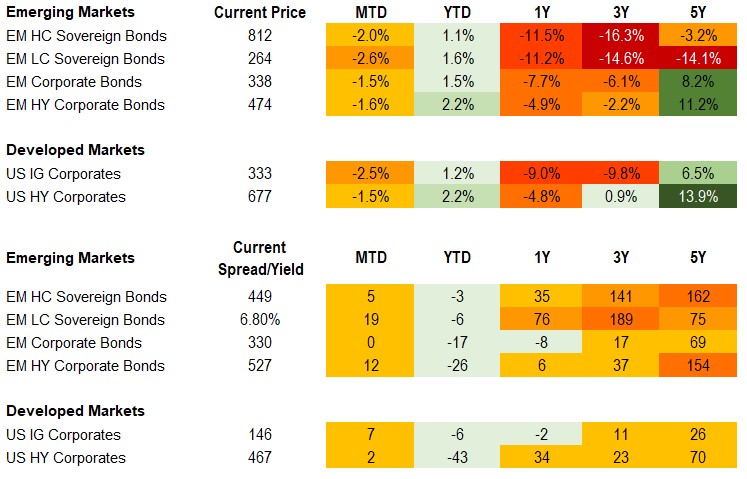
Equities
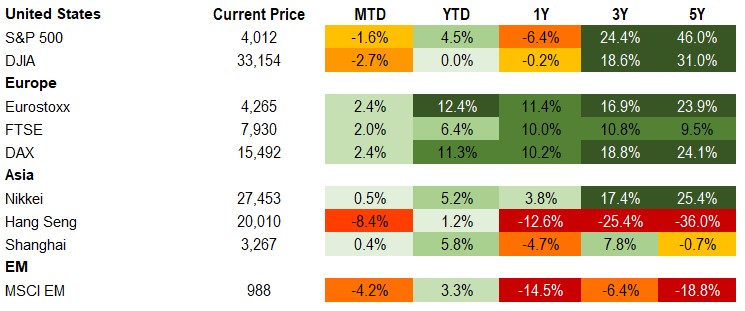
Commodities

Source for data tables: Bloomberg, JPMorgan, Gramercy. EM Fixed Income is represented by the following JPMorgan Indicies: EMBI Global, GBI-EM Global Diversified, CEMBI Broad Diversified and CEMBI Broad High Yield. DM Fixed Income is represented by the JPMorgan JULI Total Return Index and Domestic High Yield Index. Fixed Income, Equity and Commodity data is as of February 24, 2023 (mid-afternoon).
Emerging Markets Weekly Highlights
In the aftermath of devastating earthquakes, market focuses on timing of Turkey’s elections
Event: Turkey-watchers in global markets have been sifting through various noise and signals in Turkish domestic politics this week for clues on whether pivotal presidential and parliamentary elections could still take place as planned in the time window between mid-May and mid-June or if they might be postponed to later in the year or even to 2024.
Gramercy commentary: Political uncertainty in Turkey was already highly elevated ahead of the critically important elections and has increased further after the tragic natural disasters that hit the country in early February. Prior to the earthquakes, May 14th was seen as the most likely date for the parliamentary and first round of presidential elections, about a month earlier than the constitutionally mandated latest possible date of June 18th. Naturally, there is a question mark as to whether it would be logistically feasible to hold elections in the most affected regions of Turkey so soon after the disasters, given the infrastructural damage and number of displaced people. Ultimately, regardless of logistical considerations and various constitutional interpretations, the timing of the elections will depend on what President Erdogan perceives as most politically expedient for his re-election chances. According to one narrative, Erdogan would be interested in postponing the elections until later in the year (October/November) or even combining them with the local elections slated for early 2024. Given a perceived hit to his approval ratings in the wake of the devastating earthquakes, he is hoping that aggressive government financial support for the victims will repair his standing with voters. However, an election delay that is widely seen domestically as illegitimate could also backfire against Erdogan. Moreover, a competing narrative points out that the President might benefit from elections being held as planned in May or June given that the opposition has not agreed on a joint candidate yet and is running short on time if elections were to go ahead as planned. Markets should get some clarity on the timing of elections within the next couple of weeks as elections in mid-May would require President Erdogan to dissolve parliament by mid-March.
South Africa budget surprises modestly to the upside
Event: Finance Minister, Godongwana presented the 2023/24 budget on February 22nd which outlined deficit projections at 3.9%, 3.6%, and 3.3% for fiscal years 23/24, 24/25, and 25/26, respectively, down from this past year’s better than target estimate of 4.5% of GDP. Growth for this year is expected to soften to 0.9%, which is just below market consensus albeit above South African Reserve Bank’s (SARB) assumption. Eskom support encompasses R254bn of front loaded advances in the form of an interest-free subordinated loan over the next three years to be swapped into equity, contingent upon reforms, as well as a R70bn debt transfer in FY25, bringing net new support to R165bn. Debt is now set to peak at 73.6% of GDP in FY25/26 and decline thereafter.
Gramercy Commentary: We view the budget as relatively constructive in the short-term as it delivered on more comprehensive support for Eskom, which had been a lingering uncertainty, while confirming recent fiscal outperformance and commitment to fiscal responsibility. This combined with comparatively solid prospects for disinflation as the year progresses should support local assets. Over the medium-term, we see room for assumptions within the budget to face headwinds, particularly growth as well as expenditures related to wages and further SOE costs.
Emerging Markets Technicals
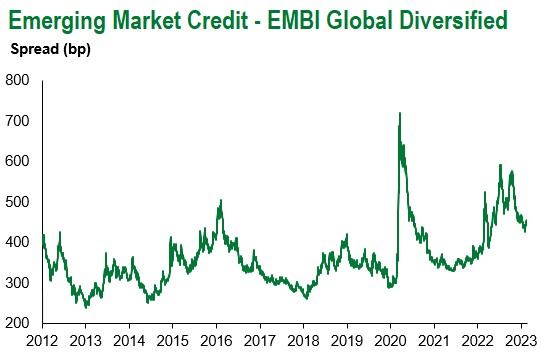
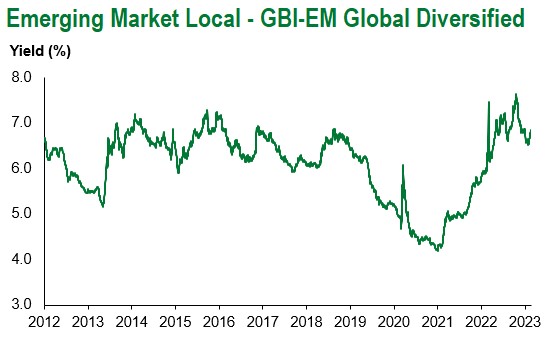
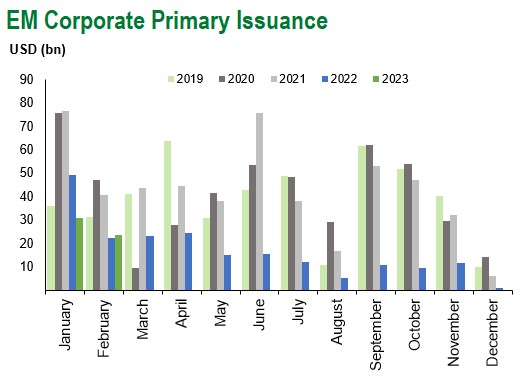
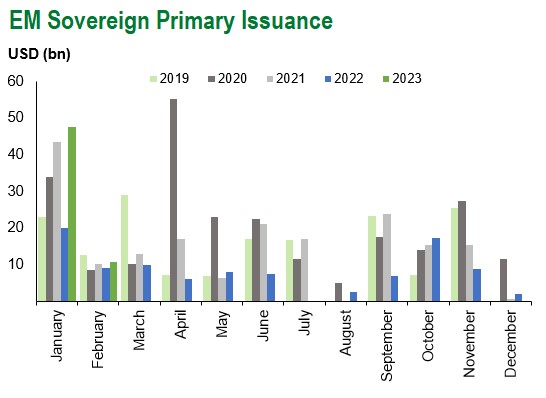
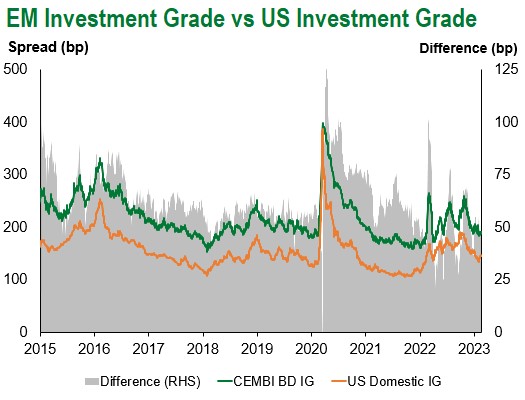
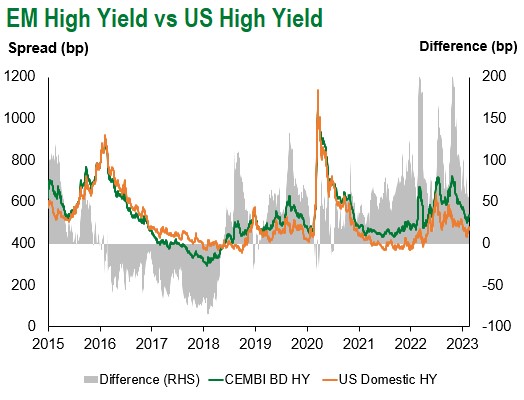
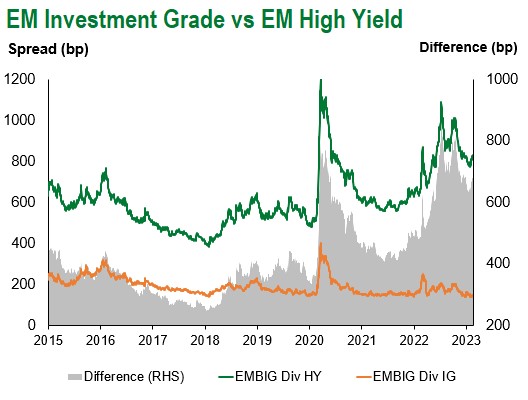
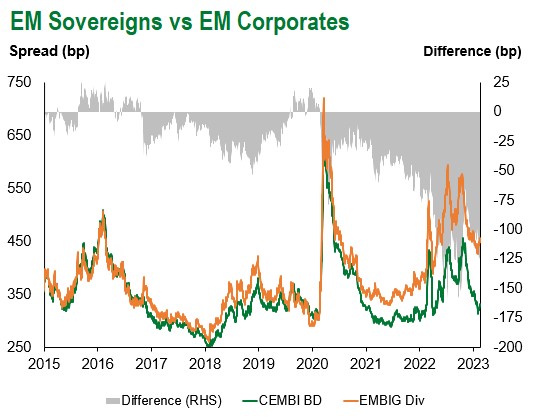
Emerging Markets Flows
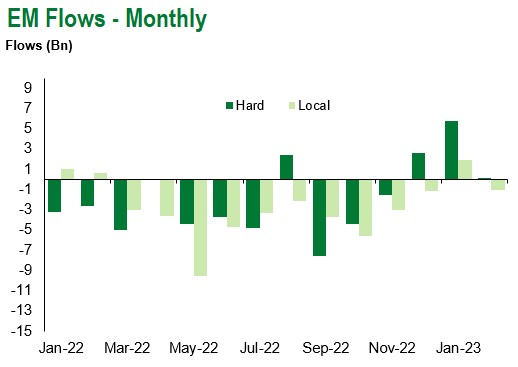
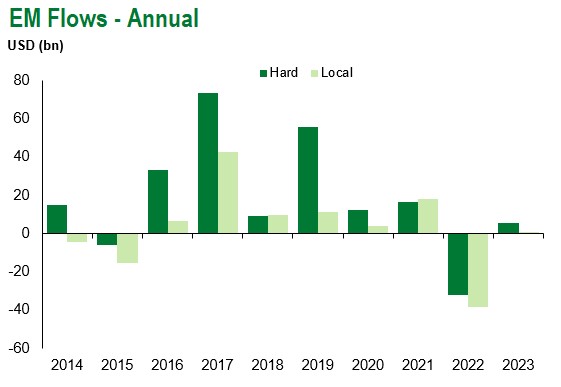
Source for graphs: Bloomberg, JPMorgan, Gramercy. As of February 24, 2023.
COVID Resources:
Johns Hopkins COVID-19 Case Tracker
For questions, please contact:
Kathryn Exum, CFA ESG, Director, Co-Head of Sovereign Research, [email protected]
Petar Atanasov, Director, Co-Head of Sovereign Research, [email protected]
James Barry, Director, Deputy Portfolio Manager, [email protected]
This document is for informational purposes only. The information presented is not intended to be relied upon as a forecast, research or investment advice, and is not a recommendation, offer or solicitation to buy or sell any securities or to adopt any investment strategy. Gramercy may have current investment positions in the securities or sovereigns mentioned above. The information and opinions contained in this paper are as of the date of initial publication, derived from proprietary and nonproprietary sources deemed by Gramercy to be reliable, are not necessarily all-inclusive and are not guaranteed as to accuracy. This paper may contain “forward-looking” information that is not purely historical in nature. Such information may include, among other things, projections and forecasts. There is no guarantee that any forecasts made will come to pass. Reliance upon information in this paper is at the sole discretion of the reader. You should not rely on this presentation as the basis upon which to make an investment decision. Investment involves risk. There can be no assurance that investment objectives will be achieved. Investors must be prepared to bear the risk of a total loss of their investment. These risks are often heightened for investments in emerging/developing markets or smaller capital markets. International investing involves risks, including risks related to foreign currency, limited liquidity, less government regulation, and the possibility of substantial volatility due to adverse political, economic or other developments. References to any indices are for informational and general comparative purposes only. The performance data of various indices mentioned in this update are updated and released on a periodic basis before finalization. The performance data of various indices presented herein was current as of the date of the presentation. Please refer to data returns of the separate indices if you desire additional or updated information. Indices are unmanaged, and their performance results do not reflect the impact of fees, expenses, or taxes that may be incurred through an investment with Gramercy. Returns for indices assume dividend reinvestment. An investment cannot be made directly in an index. Accordingly, comparing results shown to those of such indices may be of limited use. The information provided herein is neither tax nor legal advice. Investors should speak to their tax professional for specific information regarding their tax situation.
